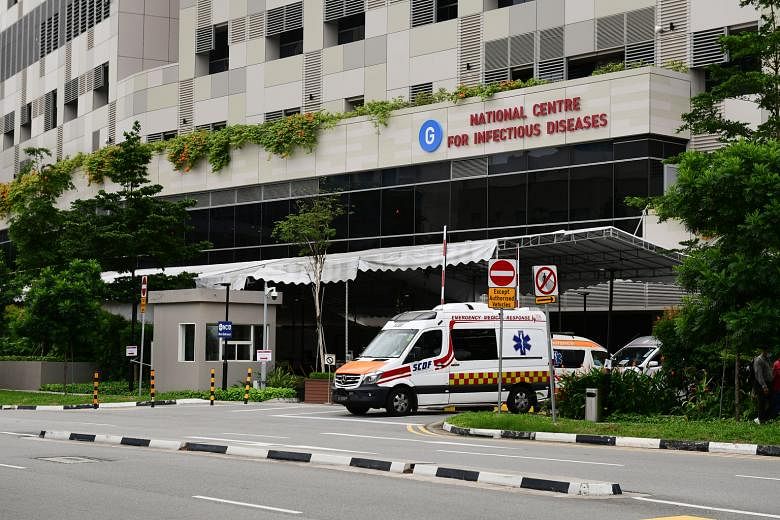The National Centre for Infectious Diseases (NCID) has been at the heart of the battle against the Covid-19 pandemic - a real baptism of fire for the 330-bed facility that was inaugurated only a year ago today.
It was expected that the NCID would ease its way towards being in the vanguard of Singapore's battle against any infectious diseases.
But less than six months after its official opening, it was plunged into combating a global pandemic.
It not only had to open up its 330 beds more quickly than anticipated, but also expand capacity to accommodate more patients. It also had to train more staff to cope with the surge in patients.
Looking back at the past 12 months, Professor Leo Yee Sin, executive director of the NCID, said: "It was a surprising first year full of challenges. Covid-19 arrived barely four months after our official opening.
"The magnitude and speed of its spread were unprecedented. We had to ramp up the entire facility beyond the original design of 330 beds to more than 500 beds at one point during the pandemic."
Fortunately, NCID's design allowed for it to be scaled up should the need arise. Nevertheless, having to nearly double capacity so quickly was challenging.
Said Prof Leo: "Because of the nature of its design to ensure clear segregation of people and materials flow, it takes time to familiarise oneself and be able to navigate within the building safely."
Staff who were trained in infection control had to forgo their leave to work with nurses from Tan Tock Seng Hospital (TTSH) next door, who were transferred over to help. Although they are trained nurses, they had not worked in a pandemic environment.
So the "borrowed" TTSH staff were paired with their NCID counterparts "who are well versed in the workplace and processes".
The NCID staff - from doctors to nurses to researchers - had to move fast to cope with a new, totally unknown virus.
The National Public Health Laboratory, which is housed in the same building, began developing a general coronavirus test on Jan 2.
When China released the genetic sequence for the coronavirus that caused Covid-19, the laboratory designed a test for the new Sars-CoV-2 virus and detected the first case of an infected person in Singapore, a visitor from China, on Jan 23.
Together with the Duke-NUS Medical School, it developed a test kit to identify those who were infected previously and had recovered.
In a testament to NCID's performance over the last year, Prof Leo co-chaired the team that drew up the World Health Organisation guideline for steroid use in Covid-19 patients, released last Wednesday.
Although the number of new Covid-19 infections has declined significantly in Singapore, Prof Leo said her team is "still working at full steam to meet new demands and progressively ramp up our regular services".
Some of these regular services - focusing on other infectious diseases, ranging from tuberculosis to chickenpox, had to be put on hold while the team concentrated on Covid-19.












